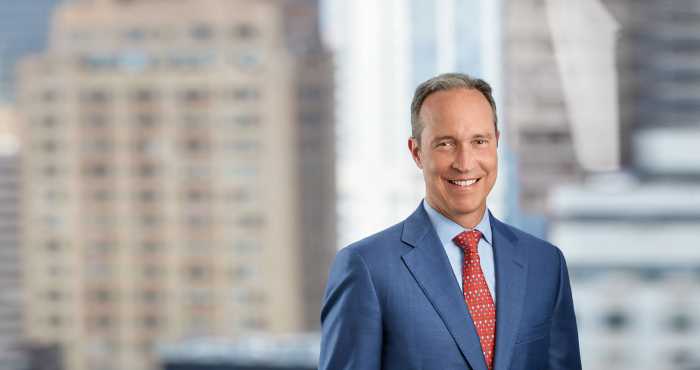Demetrius Napolitano was plunged into foster care when he was two months old, adopted at the age of five into a home where he was verbally, emotionally and physically abused, and fled at the age of 13, landing in a juvenile detention center before cycling through a total of 30 foster homes.
Now 21 and a sophomore at St. John’s University, Demetrius is being adopted again — this time, by a mentor, Katie Napolitano, 34, a program officer with an anti-poverty organization, and her husband John Napolitano, 40, a community development and planning director for an affordable housing nonprofit. He has already traded in his erstwhile last name of “Johnson” for Napolitano: “I’m hoping that opens some doors for a brother!” joked Demetrius, who is partial to fedoras fit for Frank Sinatra and hopes to become a lawyer or a business executive.
Demetrius’s adoption is remarkable for several reasons: His adoptive parents occupy a one-bedroom coop in Edgewater, NJ, and while Demetrius is guaranteed a place to lay his head (the Napolitanos gave him a key) the three have no plans to live together.
Demetrius lives in a foster home in BedStuy. Excelling in college allowed him to receive financial support from the Administration of Children’s Services while still enrolled, and he plans to transfer to an NYU dorm, should he be accepted as a student there.
After a brutal succession of trust-shattering experiences with adults, most foster youth are eager to be forever free of binding legal ties, but Demetrius’s desire to be adopted “is a psychological thing: I want to know that people are in my corner no matter what. If something happens to me, who will make decisions on my behalf?” he asked rhetorically.
Adult adoptions are rare, although they were used by same sex couples to secure inheritance, hospital visitation and other rights before the legalization of same sex marriage. The majority of foster care veterans, especially veterans of failed adoptions, “would never take a chance on adoption,” when they are finally old enough to live on their own, even though anyone over age 18 can choose to be adopted by another adult, said Dawn Post, co-borough director of The Children’s Law Center.
Demetrius “is unique,” in purposely finding and forging a family and in his strategic decision to wait, so he can first use the educational benefits to which he is entitled, Post said. Too, he has an enviable ability “develop relationships with adults who can help him move forward … He is one of those young people who showed such resiliency and was determined to make the system work for him. I wish all our (foster) youth were as resilient,” Post said. According to Foster Care to Success, only 20% of foster youth go to college and only 2 — 9% attain a bachelor’s degree. Too often, Post lamented, foster care veterans wind up “homeless, in jail or dead.”
Demetrius said he has faith that this family will work out because “I finally found the right people … This love, this relationship runs deeper than skin color: They’re always just there for me — even financially, if need be.”
Katie and John had already served as the go-to adults for two brothers aging out of foster care, Miguel, 21, and Jonathan, 22, taking on the moral responsibility of their care without legally adopting them, when they met Demetrius early last year and helped him untangle a tuition problem that left him terrified he would have to leave college.
Napolitano weekends are spent boxing, hiking, camping, as well as strategizing educational, recreational and career objectives while doling out dinners, high-fives and encouragement.
Katie, who had an idyllic childhood upstate, met Miguel and Jonathan when she worked as a Court Appointed Special Advocate, eventually resigning when she became involved in helping them hack life problems because there was no one else to do so. The more she found out about the grind of poverty, violence, indifference and ignorance many foster youth endure, the more she yearned to help them navigate the educational, career and relationship challenges that derailed so many from a successful independence.
There are advantages to a ready-made, nontraditional family beyond exemption from teething peevishness and diaper duty. “These kids are so grateful,” said Katie, noting that many biological kids take such things as an open, nonjudgmental ear and homework help for granted.
After repeated placements with single moms, Demetrius needed “fathering,” more than mothering, Katie believed. But her husband found out he also relished becoming a dad. When Demetrius called to tell him his grades — a 3.0 his first semester, and a 3.6 the next — “he was so ecstatic. It reminded me of how I was when I came home as a little kid,” brandishing report cards, John said. His job as a father is mostly one of “keeping our word,” lavish validation, strategizing solutions to life problems and encouraging Demetrius to “keep striving and working hard.”
Many of Demetrius’s foster parents “did not embrace him completely,” John says delicately, leaving “a chasm in his heart.” Spending time with his sons provides John an opportunity to pass on his own cherished patrimony: “My grandfather was a firefighter with Ladder 112 in Bushwick: He taught me to always treat people with respect and that everybody is somebody. I can now pass that on to Demetrius,” John said. Ditto all the lessons he has learned about structuring research papers, time management, the art of balancing humility with self-esteem “and not letting anyone with more wealth than you make you feel inferior.”
Demetrius has already paid off paternal pride dividends: “I see a lot of myself in him,” John said, continuing, “He gives money to strangers! Random acts of kindness! He met a homeless kid who needed money for food and got off the bus and bought him a meal. I told him that makes me more proud than any A+ he earns in a college class.”
SIDEBAR
“A lot of our friends and family members have become mentors,” as a result of meeting the three young men who are now a part of the Napolitano family, Katie Napolitano said. You do not necessarily need to foster or adopt young people in order to help them become successful and financially independent. Many young people in NYC are actively seeking adult mentors to help them figure out how to achieve their educational and career objectives. Here are some organizations that can help match mentors with mentees:
The website for the Jamel Robinson Child Welfare Reform Initiative (www.jrcwri.org) is down for construction, but interested adults can email mentorship@jrcwri.org and ask how to apply to become a mentor to a youth exiting foster care. “Mentorship is the missing link” in providing young people direction to avoid homelessness, violence and prison, said CEO and President Jamel Robinson, a veteran of the NYC foster care system himself.
The National Mentoring Resource Center (www.mentoring.org) offers a data base to find a program near you that matches mentees with mentors.
Big Brothers Big Sisters NYC (www.bigsnyc.org ) offers opportunities to mentor young people in the juvenile justice system and those who have incarcerated parents, kids who are immigrants and others.



































